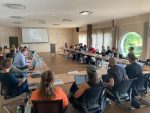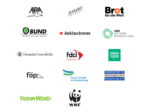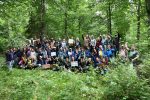70 NGOs call for sustainable and socially just EU bioeconomy strategy
Bremen, Brussels – 12. March 2024
Download the position paper as a PDF here!
With the impending revision of the EU Bioeconomy Strategy on the horizon, 70 non-governmental organizations (NGOs) have jointly issued a position paper today, advocating for a bioeconomy that upholds both ecological sustainability and social equity.
The undersigned organizations emphasize that the focus of the bioeconomy strategy must fundamentally shift for this purpose. The current waste economy must be stopped. They assert that large-scale biomass imports from the Global South are not a viable solution. Moreover, the NGOs assert that waste and residues alone will not suffice to meet the future economy’s raw material requirements.
In addition to these points, the NGOs call for genuine participation of citizens and civil society, urging for tangible resources to support their involvement, not just on paper.
The initiative to release this statement was coordinated by the Bioeconomy Action Forum, with active involvement from denkhausbremen, FERN, and ELF, all committed to promoting a responsible bioeconomy.
NGOs raise concerns: Bioeconomy leads to further ecosystem exploitation
The term “bioeconomy” is intended to sound green and natural, a refreshing alternative to the fossil economy. But a closer look at current discussions around this political term reveals that the bioeconomy has the potential to further erode human and social rights and aggravate environmental destruction. Forests and other ecosystems are already being overexploited for paper and packaging, bioenergy and more.
We have surpassed what can be sustainably supplied and so moving from fossil to bio sources without embedding it in a wider socio-ecological transformation and drastically reducing consumption would be a disaster. We, the undersigned associations and organisations, have therefore come together to call on the European Union (EU) and the national governments of its members to end the waste economy and to design European land use policies that protect people, nature and our climate.
Europe is banking on the promises of the bioeconomy. In recent years, several European countries have adopted their own bioeconomy strategies, and the EU released its updated strategy in 2018 with the title “A Sustainable and Circular Bioeconomy”. The bioeconomy is also explicitly referenced in the European Green Deal. In all of these strategies, the idea is to develop an economy based on biological resources. The focus is on replacing fossil fuels with biomass rather than on changing the prevailing wasteful energy- and resource intensive economic model.
The strategies ignore the fact that increasing demand for biomass would pose an additional threat to global ecosystems and the people who depend on them. Even today, the ecosystems from which these resources would come are dramatically overused, as planetary boundaries are being exceeded.
The economy of the future must be environmentally responsible and socially just
For the bioeconomy not to be a destructive force, the focus on such strategies needs to be fundamentally changed – it must break free from the compulsion of growth, accept ecological and planetary boundaries, promote sufficiency, and aim to build a fair society. Only by significantly reducing extraction and resource consumption, in all sectors of the economy, can we meet the demand for biological resources without further harming biodiversity and the climate.
Land is limited
Intact natural ecosystems such as forests and wetlands are essential carbon stores for climate protection as well as habitats for the preservation of biodiversity. Meeting climate and biodiversity goals will therefore require conserving and sustainably managing a much larger portion of land. With the European Green Deal and the European Biodiversity Strategy, the EU has set a goal of protecting 30 percent of its land and marine areas and promoting ecosystem restoration.[1]
This reduces the already limited land for biomass production and increases competition for land from food and feed production, recreation, infrastructure, and urban development. Limited land cannot be allocated multiple times, so it must be used in the most socially just way. Any bioeconomy strategy would need to include aims to alleviate the pressure on land use, such as by significantly reducing consumption of animal products and, thereby, the cultivation of animal feed.
Biomass imports from the Global South are not a solution
Imports of biomass from the Global South are a cornerstone of raw material supply in many bioeconomy scenarios, but this is highly problematic and unfair. Industrial agriculture and forestry are already displacing and exploiting people in the affected countries, as well as destroying natural habitats. A dramatic increase in biomass demand would exacerbate these problems. We therefore need effective measures to reduce resource consumption as well as mandatory ecological and social standards.
Long-term material over energy use: Stop the waste!
Because biomass is a limited resource, and intensive land use has harmful consequences for both humans and nature, it is essential to follow the cascading use principle: Prioritise long-term material uses over short lived disposable products, and only use biogenic resources for energy at the end of its life cycle. Creating energy from biomass, such as in biogas plants, for biofuels or wood burning, is an environmentally damaging waste of valuable resources. Countries and the EU need to remove incentives for wood burning and to introduce policies to reduce single-use packaging and implement reusable systems.
Waste and residual resources are already being used
It is clear that fields, forests, and seas cannot supply enough resources for a bioeconomy at today’s consumption levels, so some strategies consider also using waste and residual materials – but these are already a scarce commodity subject to vigorous competition. In agriculture, “residual materials” like straw are widely used. In fact, they are considered a useful resource.
In truly sustainable forestry, “forest residues” would be left in the forest as they are a key part of the ecological cycle. As such, material defined as waste or residual can provide only limited amounts of raw material for the bioeconomy.
Community participation is essential
To ensure broad societal participation in the implementation of the bioeconomy, engaging civil society and citizens on an equal footing is essential. They need to much more than before help identify conflicting goals, and to be asked to help design an economy built with the interests of future generations at its heart. European governments and EU institutions should establish suitable procedures and allocate adequate resources to ensure this happens.
[1]: Although this was the initial goal of the European Green Deal, the final Nature Restoration Law (part of the package to implement the Deal) actually called for 20 percent of land and marine areas to be restored and land for biomass production to integrate nature restoration objectives. Competition for land will still be fierce and so our recommendations remain the same.
Updated version as of 14th March 2024. Signed by:
AbibiNsroma Foundation – Ghana
Amis de l’Afrique Francophone – Benin
ARA – Germany
Arnhems Peil – Netherlands
Association Workshop for All Beings – Poland
Aurora – Sweden
Bergwaldprojekt – Germany
Biodiversity Conservation Center – Russia
BirdLife – Europe
Blue Dalian – China
Bulkley Valley Communities Coalition – Canada
Bund für Umwelt und Naturschutz Deutschland – Germany
CEDENMA – Equador
Coastal Plain Conservation Group – United States
Colectivo VientoSur – Chile
Comité Schone Lucht – Netherlands
De Bomenbond – Netherlands
De Klimaatcoalitie – Netherlands
Denkhausbremen – Germany
Deutsche Umwelthilfe – Germany
Earth Action – United States
Earthbilt – United States
Earth Thrive – UK/Serbia
Ecodevelop – Germany
EcoNexus – UK
Ecoropa – Europe
EDSP ECO – Netherlands
Ekomaktab – Uzbekistan
Estonian Fund for Nature – Estonia
Environment East Gippsland – Australia
European Environmental Bureau (EEB) – Europe
FDCL – Germany
Federatie tegen Biomassacentrales – Netherlands
FERN – Europe
FIAN Deutschland – Germany
Forum Ökologie & Papier – Germany
Forum Umwelt und Entwicklung – Germany
Fridays for Future Sundsvall – Sweden
Fridays for Future Sweden – Sweden
Fridays for Future Uppsala – Sweden
Friends of the Earth International
FSCI, Dastgiri Center – Tajikistan
Global Forest Coalition – International
Green Longjiang – China
Green Squad – Croatia
Instituto para el Futuro Común Amerindio IFCA – Honduras
International Association of River Keepers Eco-Tiras – Moldova
Landelijk netwerk Bossen en Bomenbescherming – Netherlands
Leefmilieu – Netherlands
LPESM Riau – Indonesia
Luontoliitto – Finland
Milieudefensie – Netherlands
Miljöjuristerna – Sweden
Natural Forest Academy – Germany
Naturschutzbund Deutschland – Germany
NOAH Friends of the Earth Denmark – Denmark
PanEco Foundation – Switzerland
Pivot Point – United States
Profundo – Netherlands
Pro Regenwald – Germany
Protect the Forest – Sweden
Pro Wildlife – Germany
Rettet den Regenwald – Germany
Rainforest Action Network – United States
Robin Wood – Germany
Save Estonia’s Forests – Estonia
Scholar Tree Alliance – China
Snow Alliance – China
Society for Responsible Design – Australia
Sustainable Development Institute (SDI) – Liberia
Teraz Lasy! – Poland
Victorian Forest Alliance – Australia
Wuhu Ecology Center – China
ZERO – Associação Sistema Terrestre Sustentável – Portugal







